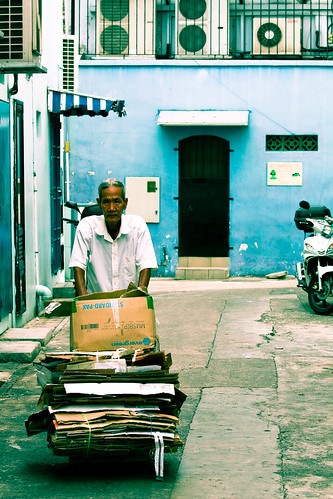The Straits Times did a feature length Insight article on 30 July on Aljunied Group Representational Constituency (GRC), which witnessed the fiercest contest of the 2006 General Elections (GE), between a Workers’ Party (WP) team helmed by its chairman, Sylvia Lim, and the PAP team led by George Yeo.
The article presented some interesting anecdotes from residents and insights from the politicians from both sides.
One Aljunied resident remarked that WP secretary-general MP Low Thia Khiang was “very good” because of the way he attended to his residents in neighbouring Hougang. Another long-time opposition supporter said he was 矛盾 (in a dilemma) about whom to vote for next time, because of the upgrading works that have been done since the last GE. Then he went on to say that if Sylvia Lim contests again, “I will still vote for the WP because it is important to have another voice in the Government. But not if others come.”
The upgrading works since the last GE included “spanking new gymnasiums at their doorsteps” and “colourful linkways that shelter them from the rain”. One of the PAP MPs boasted that there had been 51 linkways, 43 fitness corners, 18 drop-off porches and five gymnasiums built over the last four years. On top of that, there is an “iconic project” for each of the five divisions, such as an adventure park in Paya Lebar and a communal hall in Aljunied-Hougang.
Interestingly, ST’s street poll showed that only 40 per cent say they are pleased with the facilities, 30 per cent are happy with upgrading and 60 per cent, the transport infrastructure.
One resident, a kindergarten teacher (in which kindy, I wonder?), said she will be voting PAP because she believes “they have the clout and resources to continue with all the upgrading projects that have been ongoing”.
On the other hand, some residents felt there had been “unnecessary upgrading”, a “waste of resources” or poorly planned upgrading, like low quality lifts or inaccessible lift landing designs.
The article then painted the choice facing residents of Aljunied as being that of “head versus heart”. Their argument was that the PAP team should win hands down at the next GE “based on its performance on the ground” (i.e., upgrading works). However, voters may also make their choice with their “heart”, if they want more opposition MPs in Parliament to be a better check on the Government or be an alternative voice.
Having their cake and eating it
I am of the view that “head versus heart” is a false choice—there is no need for voters to choose one or the other. With the WP, they can have both. Here’s why:
Firstly, in terms of local concerns, the only thing that the PAP team has done, which a WP team will probably choose not to match, is their massive upgrading works. But do residents really need “colourful” linkways, spanking new gymnasiums and “iconic” adventure parks and communal halls? Some of those interviewed already said much of the upgrading appeared wasteful.
In any case, these works have already been done. Will the next team taking over the GRC—whether PAP or WP—need to do even more upgrading over the next five years? Probably not much. Furthermore, the PAP Government has pledged to complete lift upgrading works in all wards by 2014—just three years away. So neighbourhood upgrading should be a non-issue for the rational voter.
Secondly, the accessibility of MPs, traditionally measured in terms of the frequency of walkabouts or holding MPS. By these two measures, the WP has proven it can and will continue to do these—perhaps even to a greater extent than the PAP MPs.
Sylvia Lim said that her team started walkabouts a month after the last GE in 2006. In any given week, the WP has a few teams visiting the GRC. So far, the WP has visited about 500 blocks, which is no mean feat for a party without the luxury of “staff augmentation” by People’s Association grassroots leaders and government agency representatives tagging along on during their walkabouts.
Ms Lim also explained that her walkabouts often took longer, as WP team members “tend to chat more with the residents”, indicating deeper engagement during the house visits. In addition, I have no doubt that many of the WP candidates, if they win, will devote more time to their Parliamentary and constituency work than the current PAP MPs, not one of whom is a full-time MP.
Thirdly, an effective alternative party like the WP, with a significant presence of five capable MPs in Parliament, will be able to speak up loudly and clearly for ordinary Singaporeans in a way that ruling party MPs can never do.
PAP MPs claim to speak out for their residents, but they are constrained as to how far they can go without being smacked down by their party elders. These MPs know their re-election hinges on the endorsement of their party elders. Why? Because if they are not fielded by their party in the next GE, they have absolutely no chance of being elected!
In any case, as a member of a political party, they are expected to support their own party and not oppose it, so they will be hamstrung from the start. Things get even worse if they are front benchers (i.e., Ministers), of which there are three in Aljunied. They are not even supposed to challenge the Government, because they are part of the Government. Yes, they can voice out behind closed doors, but we all know that what’s mentioned behind closed doors can also be easily dismissed behind closed doors.
On the other hand, opposition MPs know that their political survival depends almost entirely on the endorsement of residents at the next election, not the PAP or even their own party leaders. So you can be sure that any opposition MPs worth their salt will go all out to serve the residents well, and speak out strongly for them in Parliament.
There is evidence to support this. Just look at how many speeches Sylvia Lim—the lone non-constituency MP—has made in Parliament criticising government policies and proposing alternatives. Speech-for-speech, point-by-point, have any of the Aljunied MPs matched her in terms of quantity or relevance over the past four years? The three Ministers in the team simply do their job of reading out Government Bills and defending Government policies. They don’t challenge the Government in Parliament. As for the two backbenchers, I cannot recall any memorable points or issues raised by them.
In summary, I feel that when making a comparison between the PAP and WP teams, one should consider, how much the WP has done with its limited resources, and how much more it can do when it has the resources of five elected MPs (or more, if other wards fall to the WP). If I were a resident of Aljunied, choosing to support WP there would be a very rational and logical decision indeed, as well as one that will go down well with my heart and conscience!
The Straits Times did a feature length Insight article on 30 July on Aljunied Group Representational Constituency (GRC), which witnessed the fiercest contest of the 2006 General Elections (GE), between a Workers’ Party (WP) team helmed by its chairman, Sylvia Lim, and the PAP team led by George Yeo.
The article presented some interesting anecdotes from residents and insights from the politicians from both sides.
Continue reading “Voting with your head or heart? You can do both”

